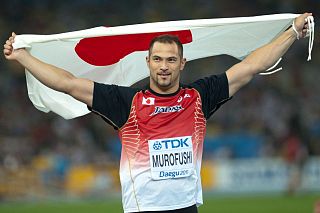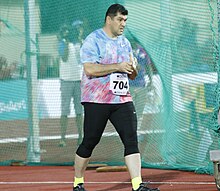
The men's hammer throw competition at the 2004 Summer Olympics in Athens was held at the Olympic Stadium on 20–22 August. There were 35 competitors from 24 nations. After a series of doping-related disqualifications, the event was won by Koji Murofushi of Japan, the nation's first medal in the event. All distances are given in metres.

Belarus competed at the 2004 Summer Olympics in Athens, Greece, from 13 to 29 August 2004. This was the nation's fifth appearance at the Summer Olympics in the post-Soviet era. The Belarus Olympic Committee sent a total of 151 athletes to the Games, 82 men and 69 women, to compete in 22 sports.

Koji Alexander Murofushi, is a former Japanese hammer thrower and sports scientist. He has been among the world elite since the 2001 World Championships, where he won the silver medal. He was the 2004 Olympic champion. In 2011, he was crowned world champion.

Dilshod Jamoliddinovich Nazarov is a Tajik track and field athlete who specializes in the hammer throw. He has represented his country at the Olympic Games on four occasions, winning the gold medal in Rio de Janeiro, the first gold medal for Tajikistan in the history of the Olympic Games.

The men's hammer throw at the 2008 Summer Olympics took place on 15 August (qualifying) and 17 (final) at the Beijing National Stadium. There were 33 competitors from 26 nations. The event was won by Primož Kozmus of Slovenia, the nation's first medal in the event.
The Men's Hammer Throw event at the 2009 World Championships in Athletics was held at the Olympic Stadium on August 15 and August 17. With reigning champion Ivan Tsikhan banned from competition for doping offences, the 2008 Olympic gold and silver medallists Primož Kozmus and Krisztián Pars were the favourites in the event. Pars entered the competition with a world-leading throw of 81.43 m and an 18 competition win-streak. Belarusian Yuriy Shayunov and Russian Aleksey Zagornyi, the only other athletes to have thrown over eighty metres twice that season prior to the championships, were identified as possible podium finishers. Nicola Vizzoni, Igor Sokolov, Olli-Pekka Karjalainen, Szymon Ziółkowski, Koji Murofushi, and Libor Charfreitag were all predicted to have an outside chance of a medal.

The men's hammer throw competition at the 2012 Summer Olympics in London, United Kingdom was held at the Olympic Stadium on 3–5 August. There were 41 competitors from 32 nations. The event was won by Krisztián Pars of Hungary, the nation's first victory in the men's hammer throw since 1996 and fifth overall. Primož Kozmus of Slovenia, the 2008 winner, took silver. Koji Murofushi of Japan, the 2004 winner, took bronze. Kozmus and Murofoshi were the 12th and 13th men to earn multiple medals in the hammer throw.

Paweł Fajdek is a Polish hammer thrower, a five-time World Champion, European Champion, Olympic bronze medal winner, multiple Polish Champion and Polish men's hammer throw record holder. In 2013, he became the youngest world champion in the event. His personal best throw of 83.93 metres was achieved on 9 August 2015 at the Janusz Kusociński Memorial in Szczecin.

The men's shot put competition at the 2016 Summer Olympics in Rio de Janeiro, Brazil. The event was held at the Olympic Stadium on 18 August. Thirty-four athletes from 24 nations competed. The event was won by Ryan Crouser of the United States, the nation's first victory in the event since 2004. His teammate Joe Kovacs took silver. Tomas Walsh earned New Zealand's first medal in the men's shot put.

Tajikistan competed at the 2016 Summer Olympics in Rio de Janeiro, Brazil, from 5 to 21 August 2016. This was the nation's sixth consecutive appearance at the Summer Olympics in the post-Soviet era.
The men's hammer throw at the 2015 World Championships in Athletics was held at the Beijing National Stadium on 22 and 23 August.
The men's hammer throw at the 2017 World Championships in Athletics is being held at the Olympic Stadium on 9 and 11 August.

The men's shot put event at the 2020 Summer Olympics took place between 3 and 5 August 2021 at the Japan National Stadium. Thirty-one athletes from 22 nations competed. For the first time in Olympic history, the same three competitors received the same medals in back-to-back editions of an individual event. Americans Ryan Crouser and Joe Kovacs and New Zealander Tom Walsh repeated their gold, silver, and bronze (respectively) performances from the 2016 Summer Olympics. They became the 15th, 16th, and 17th men to earn multiple medals in the shot put; Crouser was the 4th to repeat as champion.

The men's discus throw event at the 2020 Summer Olympics took place between 30 and 31 July 2021 at the Japan National Stadium. Approximately 35 athletes were expected to compete; the exact number depended on how many nations use universality places to enter athletes in addition to the 32 qualifying through distance or ranking. 32 athletes from 24 nations competed. Daniel Ståhl of Sweden won gold, with his countryman Simon Pettersson earning silver. It was the first victory in the event for Sweden and the first men's discus throw medal of any color for the nation since 1972. Lukas Weißhaidinger took Austria's first-ever Olympic in the men's discus with his bronze.

The men's hammer throw event at the 2020 Summer Olympics took place between 2 and 4 August 2021 at the Japan National Stadium. Approximately 35 athletes were expected to compete; the exact number was dependent on how many nations used universality places to enter athletes in addition to the 32 qualifying through distance or ranking. 31 athletes from 21 nations competed. Wojciech Nowicki of Poland won the gold medal, adding to his 2016 bronze to become the 15th man to earn multiple hammer throw medals. It was Poland's second gold medal in the event, after Szymon Ziółkowski's 2000 victory. Nowicki's countryman Paweł Fajdek took bronze. Between them was Norwegian thrower Eivind Henriksen, with his silver being Norway's first-ever Olympic medal in the men's hammer.

The women's hammer throw event at the 2020 Summer Olympics took place on 1 and 3 August 2021 at the Japan National Stadium. Approximately 35 athletes competed; the exact number was dependent on how many nations use universality places to enter athletes in addition to the 32 qualifying through distance or ranking.

The men's javelin throw event at the 2020 Summer Olympics took place on 4 and 7 August 2021 at the Japan National Stadium. Approximately 35 athletes competed; the exact number depended on how many nations use universality places to enter athletes in addition to the 32 qualifying through distance or ranking.
The men's hammer throw at the 2019 World Athletics Championships was held at the Khalifa International Stadium in Doha, Qatar, from 1 to 2 October 2019.
The men's hammer throw at the 2022 World Athletics Championships was held at the Hayward Field in Eugene on 15 and 16 July 2022.










